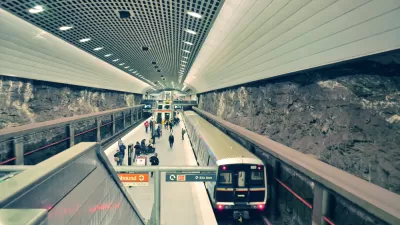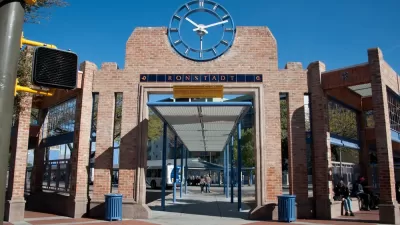How making public transportation cost-free has—and hasn't—benefited Estonia's capital city.

In 2013, a referendum in Tallinn—the capital of Estonia—made public transportation free for residents in 2013. Now, The Guardian revisits the city to see the benefits of the program, and where it has failed to make an impact.
Perhaps surprisingly, the free transit policy has generated the city €20m in revenues annually. That’s evidently because it has encouraged thousands of people to register as residents, allowing the city to capture some of their income tax.
The policy has enjoyed a 90-percent approval rating among residents. The Guardian reports that vehicles are clean and not overcrowded, and that there seems to be a culture of ridership and accommodation for non-drivers.
But there’s "mixed evidence" about whether making transit free has improved mobility or employment opportunities for low-income residents.
It’s also not clear that it has achieved climate benefits: While more people are choosing transit over car travel, "the average length of a car journey had gone up by 31%, which meant there were more, not fewer, cars on the road." Promoting cycling and imposing fees or taxes around driving might do more to reduce driving, researchers suggested.
FULL STORY: The Tallinn experiment: what happens when a city makes public transport free?

Alabama: Trump Terminates Settlements for Black Communities Harmed By Raw Sewage
Trump deemed the landmark civil rights agreement “illegal DEI and environmental justice policy.”

Planetizen Federal Action Tracker
A weekly monitor of how Trump’s orders and actions are impacting planners and planning in America.

The 120 Year Old Tiny Home Villages That Sheltered San Francisco’s Earthquake Refugees
More than a century ago, San Francisco mobilized to house thousands of residents displaced by the 1906 earthquake. Could their strategy offer a model for the present?

In Both Crashes and Crime, Public Transportation is Far Safer than Driving
Contrary to popular assumptions, public transportation has far lower crash and crime rates than automobile travel. For safer communities, improve and encourage transit travel.

Report: Zoning Reforms Should Complement Nashville’s Ambitious Transit Plan
Without reform, restrictive zoning codes will limit the impact of the city’s planned transit expansion and could exclude some of the residents who depend on transit the most.

Judge Orders Release of Frozen IRA, IIJA Funding
The decision is a victory for environmental groups who charged that freezing funds for critical infrastructure and disaster response programs caused “real and irreparable harm” to communities.
Urban Design for Planners 1: Software Tools
This six-course series explores essential urban design concepts using open source software and equips planners with the tools they need to participate fully in the urban design process.
Planning for Universal Design
Learn the tools for implementing Universal Design in planning regulations.
Clanton & Associates, Inc.
Jessamine County Fiscal Court
Institute for Housing and Urban Development Studies (IHS)
City of Grandview
Harvard GSD Executive Education
Toledo-Lucas County Plan Commissions
Salt Lake City
NYU Wagner Graduate School of Public Service





























